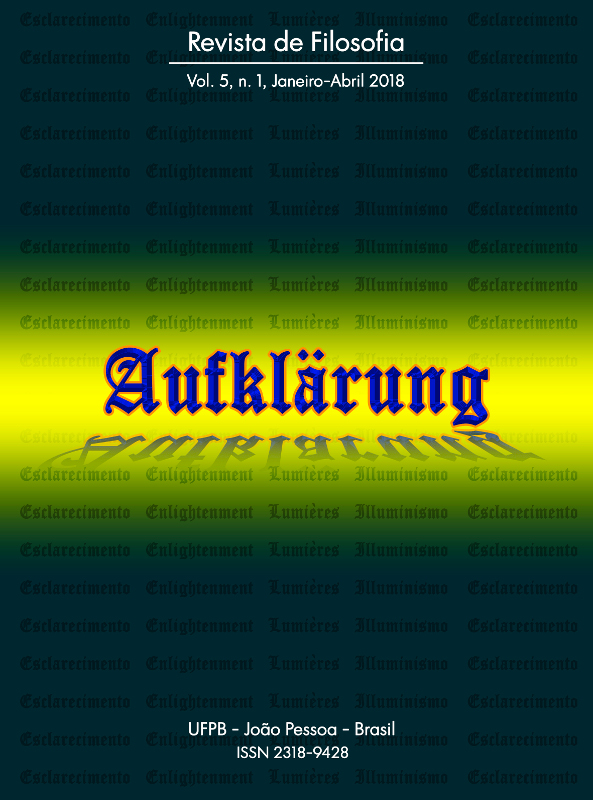Kant contra Habermas: guerra e paz no pensamento cosmopolita
DOI:
https://doi.org/10.18012/arf.2016.38341Palavras-chave:
Habermas, Kant, cosmopolitismo, paz, guerraResumo
Em seu artigo de 1995, comemorativo dos 200 anos da obra Rumo à paz perpétua de Kant, Habermas fez uma série de críticas tanto normativas como históricas acerca do cosmopolitismo kantiano. A primeira delas assinala o caráter negativo do conceito de paz: (1) porque, como pensador do século XVIII, Kant desconhecia o sentido da guerra total e; (2) não considerava as mudanças necessárias nas condições econômicas, sociais e culturais necessárias para fomentar a paz. Contudo, o projeto kantiano de paz apresenta um sentido positivo na medida em que a paz depende de reformas políticas que propiciem o desenvolvimento da constituição republicana, ao mesmo tempo em que uma tensão irremediável entre guerra e paz possibilita uma aproximação constante à paz perpétua e exige um espírito de liberdade negativa tanto religiosa como econômica.
Downloads
Referências
ARAMAYO, R. (org). La paz y el ideal cosmopolita de la Ilustración: a propósito del bicentenario de “Hacia la paz perpetua” de Kant. Madrid: Tecnos, 1996.
ARENDT, H. The human condition. 2nd ed., Chicago: University Chicago Press, 1958.
ARISTÓTELES. Política. Madrid: Gredos, 1988.
BENHABIB, S. Kosmopolitismus und Demokratie: Von Kant zu Habermas. Goethe-Institut e. V., Fikrun wa Fann, Juni 2012. Disponível em: <http://www.goethe.de/ges/phi/prj/ffs/the/a97/de9507770.htm>. Acesso em 28 de fev. 2017.
BOHMAN, J. & LUTZ-BACHMANN, M. Perpetual peace: essay on Kant’s cosmopolitism ideal. Massachusetts: The MIT Press, 1997.
CONTRERAS PELÁEZ, F. C. Kant y la guerra: una revisión de la Paz Perpetua desde las preguntas actuales. Valencia: Tirant lo Blanch, 2007.
FINE, R. & SMITH, W. Jürgen Habermas’s Theory of Cosmopolitanism. Constellations, 10(4):469-487, 2003.
________.Kantian cosmopolitanism today: John Rawls and Jürgen Habermas on Immanuel Kant’s foedus pacificum. The King‘s College Law Journal 15: 5-22, 2004.
HABERMAS, J. Strukturwandel der Öffentlichkeit. 4.Aufl., Frankfurt am Main, Suhrkamp Verlag, 1995.
________.Die Einbeziehung des Anderen. Studien zur politischen Theorie. 2.Aufl., Frankfurt am Main, Suhrkamp Verlag, 1997.
HELD, D. Democracy and the Global Order. Stanford: Stanford University Press, 1995.
KANT, I. Kants Gesammelte Schriften. Hrsg. von der Königlichen Preussischen, bzw. von der Deutschen Akademie der Wissenschaften. Berlin: Walter de Gruyter, 1902 ss.
KLEINGELD, P. Kant’s Cosmopolitan Patriotism. Kant-Studien 94: 299–316, Walter de Gruyter, 2003.
KLENNER, H. Kants Entwurf "Zurn ewigen Frieden" - Illusion oder Utopie? Archiv für Rechts- und Sozialphilosophie, 2: 151-160, 1996.
MARTINS, C. A. & POKER, G. (org.) O pensamento de Habermas em questão. Marília: Oficina Universitária UNESP, 2008.
MERTENS, T. “Cosmopolitanism and citizenship: Kant against Habermas”, European Journal of Philosophy, 4 (1996), 328–47.
MORI, M. La pace e la ragione. Kant e le relazioni internazionali: diritto, politica e storia. Bologna: Il Mulino, 2008.
ROUSSEAU, J-J. Du contrat social. Paris: Gallimard, 1964.
________.Discours sur l'origine et les fondements de l'inégalité parmi les hommes. Paris: Gallimard, 1969.
SCRIVENER, M. The Cosmopolitan Ideal in the Age of Revolution and Reaction, 1776–1832. New York: Pickering and Chatto, 2007.
TOSEL, A. Kant révolutionnaire. Droit et Politique. 2.éd., Paris: PUF, 1990.
VELASCO ARROYO, J. C. Ayer y hoy del cosmopolitismo kantiano. Madrid: Isegoría,16: 91-117, 1997.
VLACHOS, G. La pensée politique de Kant. Paris : PUF, 1962.
Arquivos adicionais
Publicado
Como Citar
Edição
Seção
Licença
Política de Direito Autoral para os itens publicados pela Revista:
1.Esta revista é regida por uma Licença da Creative Commons aplicada a revistas eletrônicas. Esta licença pode ser lida no link a seguir: Creative Commons Attribution 4.0 International (CC BY 4.0).
2.Consonante a essa politica, a revista declara que os autores são os detentores do copyright de seus artigos sem restrição, e podem depositar o pós-print de seus artigos em qualquer repositório ou site.
Política de Direito de Uso dos Metadados para informações contidas nos itens do repositório
1. Qualquer pessoa e/ou empresa pode acessar os metadados dos itens publicados gratuitamente e a qulquer tempo.
2.Os metadados podem ser usados sem licença prévia em qualquer meio, mesmo comercialmente, desde que seja oferecido um link para o OAI Identifier ou para o artigo que ele desceve, sob os termos da licença CC BY aplicada à revista.
Os autores que têm seus trabalhos publicados concordam que com todas as declarações e normas da Revista e assumem inteira responsabilidade pelas informações prestadas e ideias veiculadas em seus artigos, em conformidade com a Política de Boas Práticas da Revista.






































